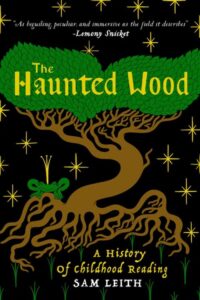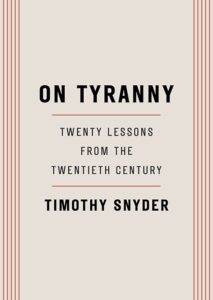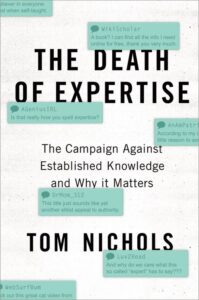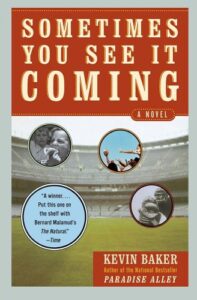Jon Wlasiuk: An Alternative History of Cleveland
January 21, 2025 by David
Filed under Non-Fiction, WritersCast
 An Alternative History of Cleveland – Jon Wlasiuk – Illustrated by Libby Geboy – Belt Publishing – Paperback – 9781953368799 – 244 pages – paperback – $19.95 – October 15, 2024
An Alternative History of Cleveland – Jon Wlasiuk – Illustrated by Libby Geboy – Belt Publishing – Paperback – 9781953368799 – 244 pages – paperback – $19.95 – October 15, 2024
This is a terrific book published by the very fine independent Belt Publishing (now part of Arcadia Publishing, a company that specializes in books about locales). Belt has long focused on books about the midwest, specifically the rust belt from which its name derives. One of its goals has been to dispel myths about the midwest and its places, not just for outsiders, but for the people who live there themselves who often do not realize the depth of the places they inhabit.
Jon Wlasiuk’s Alternative History of Cleveland is unusual and surprising. Based on the title of the book, I was expecting to be reading a Howard Zinn style political history of the city, but what Wlasiuk has done is to write a much more inventive, somewhat personal, and thoroughly engrossing narrative that takes us from the geological underpinnings of northast Ohio, through the comings and goings of indigenous peoples, and into the modern historic era, weaving together ecology, sociology, geography, arts and culture, to open our eyes to a place that so many have failed to fully comprehend. The theme throughout is that city and nature are thoroughly intertwined, and there are many people today working to make Cleveland a better place for people and nature to thrive together. Wlasiuk’s vision of the city and its environs is one that all of us can relate to, wherever we ourselves inhabit the earth. It’s a wonderful book I can highly recommend.
Talking with Jon about this book was rewarding and enjoyable for me – I hope you will feel the same after listening to this episode.
Jon Wlasiuk was born in northwest Ohio and earned a PhD in environmental history from Case Western Reserve University in Cleveland. He has taught at colleges throughout the Great Lakes region, and now lives in the Slavic Village neighborhood.
Illustrator Elizabeth (Libby) Geboy was born and raised in Wisconsin, and lives in Colorado. Her illustrations translate favorite subjects in the natural world, specifically food, flora, and fauna into art.
Podcast: Play in new window | Download
Publishing Talks Interview with Ken Whyte of Sutherland House
October 22, 2024 by David
Filed under Publishing History, PublishingTalks, The Future
 I began Publishing Talks a number of years ago as a series of conversations with book industry professionals and others involved in media and technology. Most of these interviews originally involved the future of publishing, books, and culture, talking with people in the book industry about how publishing is evolving in the context of technology, culture, and economics.
I began Publishing Talks a number of years ago as a series of conversations with book industry professionals and others involved in media and technology. Most of these interviews originally involved the future of publishing, books, and culture, talking with people in the book industry about how publishing is evolving in the context of technology, culture, and economics.
Later this series broadened to include conversations to go beyond the future of publishing. In an effort to document the literary world, I’ve talked with a variety of editors, publishers and others who have been innovators and leaders in independent publishing in the past and into the present.
These conversations have been inspirational to me on many levels. I have gotten to speak with visionaries and entrepreneurs, as well as editors and publishers who have influenced and changed contemporary literature and culture. I’ve also had the opportunity to speak with a number of friends and colleagues I have met or worked with during the many years I have been in the book business.
More recently, I’ve been talking to book folks about what is going on in publishing today, quite often about the changes in marketing and promotion that have marked all media industries as social media has overwhelmed traditional media, creating an extremely complex and constantly changing environment.
One thing is certain about publishing – there are no final answers, but there are many really important questions that we should be asking all the time.
I recently had the opportunity to (virtually) meet and talk to Kenneth (Ken) Whyte, founder and president of the Toronto based Sutherland House publishing company. I discovered Ken through his excellent and thoughtful newsletter called SHuSh, where he writes about a wide range of book industry matters as well as people and books he is connected to or has published. Ken started in journalism and magazine writing and publishing, wrote nonfiction books himself, and then started Sutherland House. One might reasonably question why any sane person would start a commercial publishing house in the current troubled media environment, but Sutherland House appears to be successful and is clearly well run and intelligently managed. I thought it would be interesting and valuable to talk to Ken about his thinking about books and publishing. He is an innovator and clearly a smart publisher who has figured out how to sell books.
We talked about a wide range of subjects and concerns that will be of interest to anyone who follows current publishing and media trends. We talked about the current state of Canadian publishing, which is simultaneously similar and very different from the US publishing scene. And we talked as well about many of the challenges and opportunities that exist for publishers and authors in Canada and the USA alike. We talked about AI and its actual uses in publishing, consolidation in retail and how publishers must navigate markets, author income issues, ebooks, book pricing, changes in the overall media landscape, and much more.
From the Sutherland House website:
At Sutherland House, we believe in the power of a distinct aesthetic, and each of our publications reflects the unique essence of our brand. From inception to launch, every title undergoes meticulous market testing to ensure its resonance with our discerning readership. All of our books are simultaneously published in both Canada and the United States, supported by robust sales and distribution channels in both countries.
Kenneth Whyte was editor-in-chief of Saturday Night Magazine, founding editor of The National Post, editor and publisher of Maclean’s, president of Rogers Publishing, and founding president of Next Issue Canada. He is the author of The Sack of Detroit: General Motors and the End of American Enterprise and The Uncrowned King: The Sensational Rise of Willian Randolph Hearst.
Podcast: Play in new window | Download
Publishing Talks Interview with Leah Paulos Press Shop PR
September 4, 2024 by David
Filed under PublishingTalks, The Future
 Publishing Talks began years ago as a series of conversations with book industry professionals and others involved in media and technology. Most of these interviews originally involved the future of publishing, books, and culture, talking with people in the book industry about how publishing is evolving in the context of technology, culture, and economics.
Publishing Talks began years ago as a series of conversations with book industry professionals and others involved in media and technology. Most of these interviews originally involved the future of publishing, books, and culture, talking with people in the book industry about how publishing is evolving in the context of technology, culture, and economics.
Later this series broadened to include conversations to go beyond the future of publishing. In an effort to document the literary world, I’ve talked with a variety of editors, publishers and others who have been innovators and leaders in independent publishing in the past and into the present.
These conversations have been inspirational to me on many levels. I have gotten to speak with visionaries and entrepreneurs, as well as editors and publishers who have influenced and changed contemporary literature and culture. I’ve also had the opportunity to speak with a number of friends and colleagues I have met or worked with during the many years I have been in the book business.
More recently, I’ve been talking to book folks about what is going on in publishing today, quite often about the changes in marketing and promotion that have marked all media industries as social media has overwhelmed traditional media, creating an extremely complex and constantly changing environment.
One thing is certain about publishing – there are no final answers, but there are many really important questions that we should be asking all the time.
I recently had the opportunity to (virtually) meet and talk to Leah Paulos about some of these questions. Leah is the Founder and Director of Publicity at Press Shop PR and Book Publicity School, and has worked in books and media for over 25 years. Leah has spoken on book publicity at Columbia School of Journalism, CUNY Graduate Center, and as part of her regular workshop series, Book Publicity for Literary Agents. She’s been a magazine editor and a writer, before shifting careers and becoming a book publicist in 2006. She launched her own business, Press Shop PR in 2012 and has worked on campaigns for over 300 authors since its launch, including for ON TYRANNY by Timothy Snyder, MARCH by Rep. John Lewis, and WELCOME TO THE UNIVERSE by Neil deGrasse Tyson.
In 2023, Leah launched Book Publicity School to bring professional PR support directly to authors, as so often today, book publishers require their authors to lead their own publicity efforts. With workshops and coaching programs, Book Publicity School provides authors with tools, strategies, and know-how to effectively advocate for their own work.
With an ever increasing abundance of book product in the market, every author and every publisher is desperately trying to figure out how to reach readers. Our creativity and ability to innovate are constantly being challenged. We need more conversations like this one to help spur us advance our thinking. Authors and publishers alike want to know what works, what doesn’t. And what is on the horizon. Since everything is changing all the time, the only way to keep up is to talk to as many people as possible about what they are doing and what they are observing. I hope this conversation will therefore be useful to writers, publishers, and readers as well.
Please ping me if you have any questions or ideas spurred by this discussion.
Podcast: Play in new window | Download
Kevin Baker: The New York Game: Baseball and the Rise of a New City
July 30, 2024 by David
Filed under Non-Fiction, WritersCast
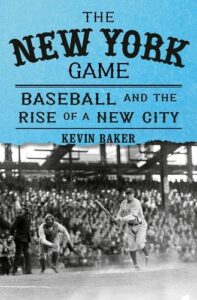 The New York Game: Baseball and the Rise of a New City — Kevin Baker — Knopf Publishing – 9780375421839 – Hardcover — 528 pages — $35.00 — March 5, 2024 — ebook versions available at lower prices
The New York Game: Baseball and the Rise of a New City — Kevin Baker — Knopf Publishing – 9780375421839 – Hardcover — 528 pages — $35.00 — March 5, 2024 — ebook versions available at lower prices
I am guessing that anyone who knows me well will be aware that baseball has been a lifelong passion. I’ve written baseball poetry and stories, interviewed former players, and talked to writers about baseball many times over the years. I’ve read hundreds of baseball books, and published a few as well. Among the legion of great baseball novels, Kevin Baker’s Sometimes You See it Coming is one of my all time favorites. And of all the nonfiction baseball books I’ve come across, his newest book, The New York Game is among the very best.
In this The New York Game, Kevin tells the history of America’s greatest city through the lens of America’s greatest game. He is a masterful story teller, weaving together multiple strands of cultural, political, economic, and geographic history to create a brilliant tapestry from the beginning era that baseball was invented in the New York City environs, through its glory years, ending with World War II (and leaving us waiting for the sequel that will cover the 80 years since).
One element that sets this book apart from so many other books about baseball history is that Baker seamlessly writes about the often overlooked stories of Black and Hispanic baseball players and particularly the crucial importance of the Negro Leagues in American sports history. Race and sports reflect back all the flaws and foibles of the American experiment in sometimes painful and jarring ways. Understanding (and facing) how baseball – its ownership, management, players, and fans – dealt with race and racialism over the course of American history is crucial to understanding who we are today.
Even readers who think they know all about New York City baseball will learn from this book, and will enjoy Baker’s stories about the game, always cast in his fast-moving, highly literate style. There are so many stories, vignettes, portraits and analyses, it is impossible to list them all, not just the already famous, but many figures even those of us who have studied baseball or grew up in New York will have heard of before.
I’ve interviewed Kevin twice before for Writerscast, including for his excellent socio-political economic book about modern New York City, The Fall of a Great American City. (co-published by City Point Press and Harper’s Magazine in 2019).
I cannot recommend this new book more highly, even for those who do not identify as baseball fans. Not only will you gain a deeper understanding of the history of our largest and most dynamic city, you’ll be entertained throughout by a master storyteller. It’s one of those rare books you will have trouble putting down once you start reading.
Writerscast interview with Kevin about The Fall of a Great American City
Podcast: Play in new window | Download
John Oakes: The Fast: The History, Science, Philosophy, and Promise of Doing Without
March 2, 2024 by David
Filed under Non-Fiction, WritersCast
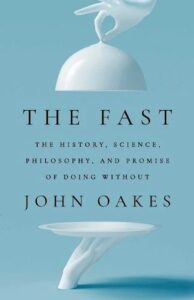 The Fast: The History, Science, Philosophy, and Promise of Doing Without—John Oakes—Avid Reader Press / Simon & Schuster—Hardcover —9781668017418—320 pages—$30—February 13, 2024—ebook versions available at lower prices
The Fast: The History, Science, Philosophy, and Promise of Doing Without—John Oakes—Avid Reader Press / Simon & Schuster—Hardcover —9781668017418—320 pages—$30—February 13, 2024—ebook versions available at lower prices
If you’re expecting to find a “how to guide to fasting” you will have to look elsewhere. John Oakes is far too good a writer and thinker to spend his time writing something simple like a guide book or even a “rah rah” tome aimed at encouraging you to take up the idea of “intermittent fasting” for yourselves. You might decide to try it out after reading The Fast, but that’s not his purpose and not why you should want to read this book. If you are already engaged in fasting, you should read this book. Perhaps it will be most especially useful during the meditative moments while you are in the midst of your own fast.
Oakes is more interested in a deeper approach to this practice, giving it historicity and enabling us to explore for ourselves how denial of a core bodily function can alter consciousness and help us better understand ourselves. This kind of antidote to the habits of modern life does have an appeal to many of us, but even if you are not going to be a practitioner, you will find yourself captivated, as he is, by the science, history, philosophy and spiritual background of fasting and the denial of physical needs. For Oakes, the ideas and the connection to human spirituality are as important as the specific practices themselves. I’m glad of that, as it makes reading this book that much more rewarding to engage with.
I will also note that Oakes, who has been an editor and publisher for many years, is a really terrific writer and therefore you can read this book for the pleasure good writing affords. As I am sure many of you who listen to this podcast have noticed, there are a lot of badly written books out there and no one wants to spend their limited time reading them. Given the vast number of choices of what to read, it is a particular joy to discover a really good writer. Bravo Oakes for spending a lifetime learning how to write, and bravo Avid Reader Press for publishing this book. I hope you will consider reading it yourself after you listen to our conversation here. Whether you decide to fast or not. For myself, much as I like this book, I am happier eating than not, even if it is an indication of my generally shallow approach to spirituality.
I’ve known John Oakes for a number of years through our mutual involvement in independent publishing. He is currently the publisher of The Evergreen Review. He is also editor-at-large for OR Books, which he cofounded in 2009. OR has been a singularly contrarian publisher for many years, built to demonstrate an alternative approach to traditional reliance on a certain popular online bookseller. Oakes has written for a variety of publications and The Fast is his first book.
We had alot of fun talking together about John’s book. Enjoy…
Podcast: Play in new window | Download
S.C. Gwynne: His Majesty’s Airship interview by David Wilk
August 28, 2023 by David
Filed under Non-Fiction, WritersCast
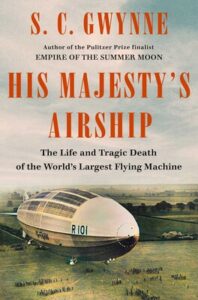 His Majesty’s Airship: The Life and Tragic Death of the World’s Largest Flying Machine — Sam Gwynne — Scribner — 9781982168278 — 320 pages — hardcover — $32.00 – May 2, 2023 — ebook versions available at lower cost
His Majesty’s Airship: The Life and Tragic Death of the World’s Largest Flying Machine — Sam Gwynne — Scribner — 9781982168278 — 320 pages — hardcover — $32.00 – May 2, 2023 — ebook versions available at lower cost
Sam Gwynne is the author of the outstanding Empire of the Summer Moon, a book I really loved. In this new work, he tells the story of a very different sort, documenting the British airship R101, but covering essentially the entire rise and fall of “lighter than air” powered flight. Like so many other airships, R101 crashed horribly in 1930 and killed almost its entire crew, including the leadership of the British airship industry, which at the time still hoped for an empire conquering means of travel. It was a massive case of a foolish, hubristic belief in something that could never succeed. It’s tempting to view this disaster as symptomatic of an empire in decline.
At least for a time, airships were a symbol of the future. R101 was, in fact, the largest aircraft ever to have flown and the product of what appeared to be advanced engineering. Somehow its supporters simply failed to recognize that these massive, hydrogen fueled, uncontrollable flying structures were bound to fail.
There is a captivating cast of characters at hand, including German inventors, well-to-do aristocrats to brilliantly flawed engineers, alcoholic flyers and even a Romanian princess and her doomed romance with the leader of the British airship program.
Gwynne is a masterful storyteller and is able to bring a previously obscure piece of twentieth century history to life for modern readers. It was a pleasure to speak with him about this book, his working methods as a writer of history, and a range of other topics as well. I’m looking forward to reading Sam’s next book, on any subject he cares to write about. He is that good a writer.
S.C. “Sam” Gwynne is the author of acclaimed books on American history: Empire of the Summer Moon and Rebel Yell: The Violence, Passion, and Redemption of Stonewall Jackson, Hymns of the Republic: The Story of the Final Year of the American Civil War, and The Perfect Pass: American Genius and the Reinvention of Football. He grew up in Connecticut, went to Princeton and Johns Hopkins, and now lives in Austin, Texas.
Sam has written for Texas Monthly and for Outside magazine. He was a Correspondent, Bureau Chief, National Correspondent and Senior Editor for Time Magazine and has also written for the New York Times, Harper’s, Los Angeles Times, San Francisco Chronicle, California Magazine, Boston Globe, Dallas Morning News, and other publications.
Buy the book from Bookshop.org
“Aviation history is nothing less than miraculous; it took a mere sixty-three years, after all, to get from the Wright brothers to Neil Armstrong. Barely a century ago, however, our skies were filled with a bounty of gliders, biplanes, and flying boats; balloons, blimps, and zeppelins. With His Majesty’s Airship, the inimitable Mr. Gwynne explores in vivid detail how this dream bloomed, and how it, in time, fell tragically to earth. He has written both a remarkable history and an eye-opening revelation of technology’s recurrent phantasms.” — Craig Nelson, award-winning author of Pearl Harbor and Rocket Men
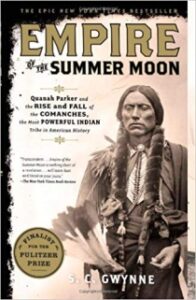
Podcast: Play in new window | Download
Robert Child: Immortal Valor: The Black Medal of Honor Recipients of World War II
May 26, 2022 by David
Filed under Non-Fiction, WritersCast
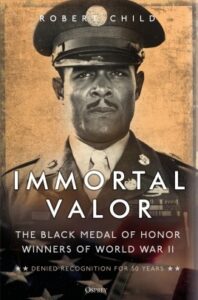 Immortal Valor: The Black Medal of Honor Recipients of World War II – Robert Child – Osprey – 9781472852854 – 288 pages – hardcover – $30 – January 11, 2022 – ebook edition available at lower prices
Immortal Valor: The Black Medal of Honor Recipients of World War II – Robert Child – Osprey – 9781472852854 – 288 pages – hardcover – $30 – January 11, 2022 – ebook edition available at lower prices
It is remarkable to realize how few medals of honor were awarded for service during World War II – there were 432 Congressional medals given out of the over sixteen million men and women who served during that four year period during which America fought large scale brutal wars in both the Pacific and European theaters. It is therefore shocking to find out that not a single African American was among the 432 honorees, despite the fact that over one million African Americans served in the then mostly segregated military environment.
Racism remains an American fact of life. But the “progress” made in the modern era probably has muddied our awareness of what our country was like such a short time ago. Robert Child has done an admirable service with this book, documenting the incredible heroism of the seven Black American heroes of World War II who were finally recognized for their efforts – but only after an incredibly long period of time and much work in their behalf.
Child documents the recent historical investigations that have discovered and the stories of extraordinary acts of heroism and valor by the Black soldiers in World War II who were eventually awarded the highest honor our country offers for wartime service. The group of servicemen includes Vernon Baker, Sergeant Reuben Rivers, and Lieutenant Charles Thomas, who led his platoon that captured a strategically important village in Germany in 1944 despite suffering grievous wounds and losing half the men in his unit. The other four who are portrayed sympathetically and thoroughly in this book are Willy James, Jr., John Fox, Edward A. Carter, Jr., and George Watson, heroes all, not only for their valor in the fights they undertook, but for what they did to overcome the deep-seated endemic racism in the military during the time they served their country.
It was not until 1993 that a US Army commission determined that these seven men had been denied our country’s highest award – only because of racial discrimination. And then it was in 1997, more than 50 years after the war that President Clinton finally awarded the Medal of Honor to them, with only one still being living at the time.
Their stories comprise most of this book, as well as some background about the military before, during and after World War II. Sadly, it is almost certain that there are other Black service men and women who might have deserved recognition for their sacrifices and heroism in that war. It was not even until the Obama administration that two World War I heroes were recognized, Sergeant William Shemin, for whom the anti-semitism of the time meant his amazing feats of heroism were almost lost to history, and Sergeant William Henry Johnson, another Black soldier who had been recognized by France with a Croix de Guerre in 1919, but neglected by the United States for far too long.
It was an honor for me to speak with author Robert Child about this terrific and highly emotional book.
Child is a military history writer, director, and author with. Robert has received writing and directing awards including an Emmy® nomination. He lives in Atlanta.
“This is the only comprehensive narrative written about the African American Medal of Honor recipients of WWII to date. Extremely well written, with very little personal background on some of these men to work with, Child manages to bring each of these heroes’ stories to life on a personal level. Child carefully reconstructs each recipient’s life prior to his act of valor, demonstrating the character traits that made each an example of integrity, sacrifice and courage. This is a must-read book about seven black soldiers and their bravery at the highest level and the racial injustice that took over four decades to acknowledge. Well done!” ―Arthur Collins, President, 5th Platoon, the black World War II education and reenactment group
Podcast: Play in new window | Download
Sarah Vogel: The Farmer’s Lawyer: The North Dakota Nine and the Fight to Save the Family Farm
April 14, 2022 by David
Filed under Non-Fiction, WritersCast
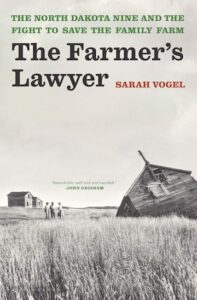 The Farmer’s Lawyer: The North Dakota Nine and the Fight to Save the Family Farm – Sarah Vogel – Bloomsbury – 9781635575262 – 432 pages – hardcover – $28 – ebook edition available at lower prices – November 2, 2021
The Farmer’s Lawyer: The North Dakota Nine and the Fight to Save the Family Farm – Sarah Vogel – Bloomsbury – 9781635575262 – 432 pages – hardcover – $28 – ebook edition available at lower prices – November 2, 2021
Many Americans think of North Dakota and the other prairie states as being conservative culturally and equally unprogressive politically. But that view of these predominantly farming states neglects their long histories of progressive populism that goes back over 100 years. That’s true of North Dakota where the Nonpartisan League was active and strong from the 1920s onward (and into the present, where it still exists as the Democratic NPL — much like the Democratic Farm Labor party in Minnesota that Hubert Humphrey represented.
That history provides the backdrop for Sarah Vogel’s true story in The Farmer’s Lawyer, which tells of a seemingly impossible-to-win legal battle, ironically against the US government agency that was established during the Depression to help family farmers, which by the 1970s was helping to destroy them. At the outset of the Reagan administration (Reagan was helped to be elected, ironically, by the support of midwestern farmers), family farmers of all sizes all across the country were experiencing the worst economic crisis since the Great Depression. Land prices, the backbone of farm economics, had gone down, while farm operating costs were up. and interest rates had skyrocketed. At the same time, in many areas, bad weather severely affected crop output.
Because of policies implemented by the Reagan administration, and growing bureaucracy in the Farmers Home Loan administration, many family farmers were being threatened with foreclosure.
At that time, Sarah Vogel, the daughter of a well known Nonpartisan League supporter and lawyer, was herself a young lawyer and single mother was in the process of leaving Washington, D.C., where she had been working for a government agency. Contacted by some desperate farmers from North Dakota who were on the verge of losing their farms, and inspired by her belief in the importance of family farms to American life, she agreed to represent these struggling clients who couldn’t afford to pay her.
In the midst of her own personal issues, but supported by her family and friends, Vogel brought a national class action lawsuit against the FHLA, which meant she would have to fight against the full force of the Reagan administration’s Department of Justice, in behalf of these family farmers’ Constitutional rights. As a young lawyer who had never privately practiced before, this was her first case!
This book tells the entire years-long saga in incredible detail, brought to life by Sarah Vogel’s writing skill and storytelling prowess. It’s difficult to imagine a true-to-life legal story that has nothing to do with murder or mayhem being a page-turner, but this book will keep you fully engaged throughout. And it will remind you of how difficult it is for “the little guys” to fight against entrenched bureaucracies, especially the Federal government. It is a heroic story for sure, and credits not only Sarah, but her father, and all the farmers she worked with, who would simply never quit, and whose stolidity made such a huge difference, not only to the outcome of their own case, but for many others that followed them.
This is a story about courage, justice, commitment, and belief in oneself. And it is important for us to be reminded that Americans can stand together for the good of all, especially now, when we can agree on virtually nothing. It is an inspiring journey I appreciated learning about. This is a terrific book, and I think we had a terrific conversation as well.
Sarah Vogel is an attorney and former politician whose career has focused on family farmers and ranchers. Vogel was the first woman in U.S. history to be elected as a state commissioner of agriculture. In 2006, the American Agricultural Law Association awarded her its Distinguished Service Award for contributions to the field of agriculture law, and Willie Nelson honored her at Farm Aid’s thirtieth anniversary in 2015 for her service to farmers. She is an advocate for Native American rights and lives in Bismarck, North Dakota.
“Sarah’s story, told in her unique voice, inspires me–and I’m sure it will inspire you–to fight for family farmers.” –Willie Nelson
Author website here.
Buy the book here.

Podcast: Play in new window | Download
Publishing Talks: Interview with George Slowik, Jr. of Publishers Weekly
February 23, 2022 by David
Filed under Publishing History, PublishingTalks
 Publishing Talks began as a series of conversations with book industry professionals and others involved in media and technology, mostly talking about the future of publishing, books, and culture. I’ve spent time talking with people in the book industry about how publishing is evolving in the context of technology, culture, and economics.
Publishing Talks began as a series of conversations with book industry professionals and others involved in media and technology, mostly talking about the future of publishing, books, and culture. I’ve spent time talking with people in the book industry about how publishing is evolving in the context of technology, culture, and economics.
Some years ago, this series broadened to include conversations that go beyond the future of publishing. In an effort to document the literary world, I’ve talked with a variety of editors, publishers and others who have been innovators and leaders in independent publishing in the past and into the present.
These conversations have been inspirational to me on many levels. I have gotten to speak with visionaries and entrepreneurs, as well as editors and publishers who have influenced and changed contemporary literature and culture. I’ve also had the opportunity to speak with a number of friends and colleagues I have met over the many years I have been in the book business.
2022 is the 150th anniversary of Publishers Weekly, the essential trade magazine of the book industry. The magazine was founded in 1872, and the fact that it has not just survived, but thrived for most of the many years it has been published says something about both the book industry and the people who have been part of its trade media.
Just as it has done for so many magazines, the digital era has meant change for Publishers Weekly, and credit is due to current ownership for guiding it successfully through very difficult times. Those of us who have been around the book business for a long time remember PW as it is ubiquitously called, when it had a lot more pages than it does today, and when it was literally the only way to get news about publishing and bookselling in one reliable place. Now the print magazine is relatively short, most of us consume it digitally, and the magazine’s products and revenues are radically different from what they were just a few years ago, including a variety of newsletters, podcasts and other digital products.
George Slowik, Jr. is the owner of the magazine’s parent company, PWxyz, LLC. Slowik had been the publisher of the magazine from 1990-1993 and later ran the excellent magazine, American Prospect, and then in 2010 he bought it from its then owner, Reed Business Information, which was in the process of selling off its entire portfolio of publications.
When Publishers Weekly was originally launched it was the bibliographical source commercial publishers used to list their forthcoming titles for booksellers. The book business was relatively small at that time, with most publishers clustered in a few cities, especially New York and Boston. Over the many years it was in business, the magazine expanded to provide news and stories about the publishing industry, and today, while the industry and the media that serves it have grown, it still is an essential source of title data, publishing over 9,000 book reviews annually at a time when book reviews are more needed than ever.
In this podcast we talked about the magazine’s history, the creation of the digital archive of its entire run, activities around the 150th anniversary year, the past, present and future state of publishing, and much more.
Even if you are not an active participant in the book industry, the history of publishing is valuable to know about as it is in many ways the history of modern culture. You can learn more about Publishers Weekly and sign up for their free email newsletters, at their website. 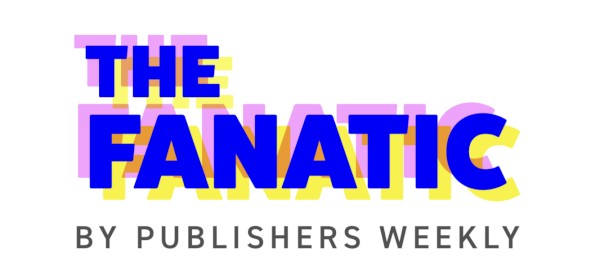
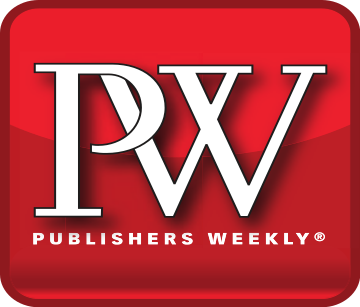

Podcast: Play in new window | Download
William J. Peters: At Heaven’s Door-What Shared Journeys to the AfterLife Teach about Dying Well and Living Better
January 25, 2022 by David
Filed under Non-Fiction, WritersCast
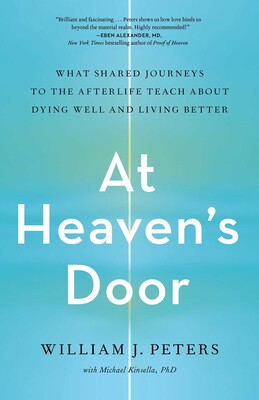 At Heaven’s Door – What Shared Journeys to the Afterlife Teach about Dying Well and Living Better – William J. Peters – with Michael Kinsella – Simon and Schuster – 978-1-9821-5042-6 – Hardcover – 248 pages – $26.00 – January 18, 2022 – ebook editions available at lower prices
At Heaven’s Door – What Shared Journeys to the Afterlife Teach about Dying Well and Living Better – William J. Peters – with Michael Kinsella – Simon and Schuster – 978-1-9821-5042-6 – Hardcover – 248 pages – $26.00 – January 18, 2022 – ebook editions available at lower prices
William Peters is a therapist who had worked for many years with people at the end of their lives. In 2000, when he was volunteering at the Zen Hospice Project in San Francisco , he experienced something very similar to what mystics describe and what some people who have been close to death have reported, the sense of floating in midair, completely out of the body. In this case, he was with his patient in this “other dimension” and the dying person looked at him and smiled. Peters himself returned to his body, but the patient remained unconscious and soon died.
This powerful experience set Peters off on what has become the journey of his life’s work. He began searching for other people who had had similar experiences. He spent more than twenty years finding people, talking to them, and meticulously categorizing their stories to identify the patterns and characteristics of what he calls the “shared crossing” experience. What is really interesting is how similar all these experiences are, regardless of age, gender, background, cultural origin, etc. Many of these stories are included in this book, as people have had visual and sensory effects that are to them evidence of another dimension, that brought with them powerful emotional after-effects that in most cases stayed with them and completely changed their understanding of reality.
Apparently this kind of experience is known to many in the hospice community and even some otherwise rationalist medical practitioners. The book is filled with stories of all kinds, some are spouses and parents of loved ones lost either suddenly or after long illnesses, and some stories are told by individuals who were simply present at someone’s final passage and were chosen to share the experience, or in some cases to help usher the dying person into the light of this “afterlife” dimension.
After years of research and documentation, Peters has a lot to say about what all of these experiences might mean for us – the living. Regardless of our outlooks and beliefs, we all want to know what will happen to us when we die, and those who have shared in the death experience as reported here might allay our all too reasonable fear and help explain what comes next. Our culture does not embrace the experience of death as many other cultures have done – our medicine tries desperately to stave off death, and we are all so attached to living, with no training or understanding of death, we push it away completely.
It does not matter whether you embrace or reject the stories told here, or the literal descriptions of the “afterlife” and the other dimensions the dying experience. Maybe what we experience at death is just a biological projection, after all. Whatever you may choose to believe, knowing more about death, understanding the end-of-life passage, and better integrating it into our lives is important for our psyches.
William Peters is the founder of the Shared Crossing Project and director of its Research Initiative. He has spent many years studying end-of-life experiences. Peters worked as a hospice volunteer with the Zen Hospice Project in San Francisco and as a teacher and social worker in Central and South America. A practicing grief and bereavement therapist, he holds degrees from Harvard’s Graduate School of Education and UC Berkeley.
I had a terrific conversation with William Peters. The book, and my conversation with the author have stayed with me and I continue to explore where it has taken me. It appears to be a simple book, but comes with many layers of understanding and thoughtfulness for the attentive reader.
Visit the Shared Crossing website here.
Podcast: Play in new window | Download



